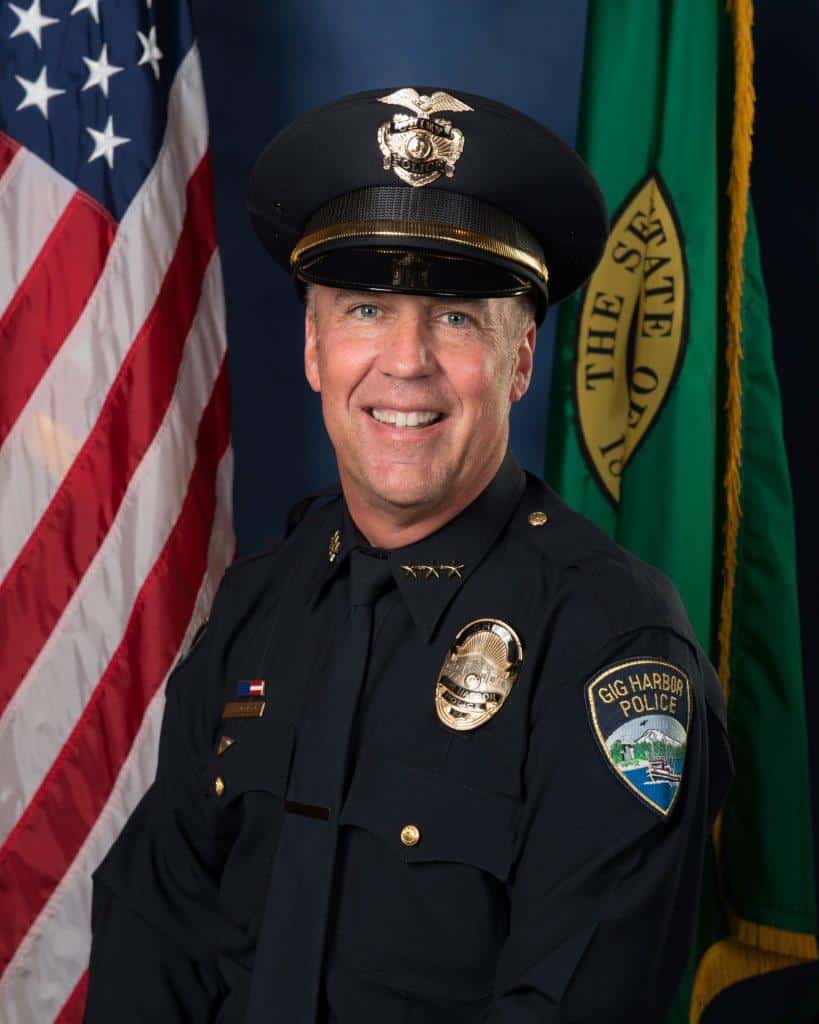Community Police & Fire
Police reform laws get mixed marks from Gig Harbor chief
In 2021, in response to nationwide protests following the death of George Floyd at the hands of Minneapolis police officers, the Washington Legislature passed several police reform bills.
Law enforcement leaders around the state, including the Washington Association of Sheriffs and Police Chiefs and Gig Harbor Police Chief Kelly Busey, raised objections to the 2021 laws.
Law enforcement officials argued that the reforms limited their ability to detain, pursue and arrest suspected criminals. The legislation also impaired officers’ ability to help people experiencing a mental health crisis, officials said.
“Some of those laws really hamstrung the police,” Busey said during a March 24 presentation to the Gig Harbor Chamber of Commerce. “They were pretty ill-thought-out.”
What passed
During the recently concluded session, legislators passed several bills aimed at correcting what Busey called the “unintended consequences” of the 2021 reforms.
• House Bill 1719 confirmed the kinds of non-lethal weapons officers can use, such as bean bags and rubber bullets. The 2021 reform legislation left law enforcement officers uncertain about whether they could use those less-lethal weapons, Busey said in an interview.

Gig Harbor Police Chief Kelly Busey
Now it’s clear that GHPD can use its 40mm “sponge rounds,” a projectile with a plastic body and a sponge nose, if necessary.
• House Bill 1735 clarified police use of force in civil and “community caretaking” situations. The legislation specifies that police can help people who are having a mental health crisis.
“With the earlier legislation, we couldn’t do that. We couldn’t even put a hand on someone’s shoulder,” Busey said. This is especially pertinent to involuntary treatment situations, he added, for which our state has a very high standard.
HB 1735 also allows use of reasonable force in “community caretaking” scenarios. Examples include helping runaway children, taking subjects into protective custody in dangerous situations, serving search warrants and when a judge asks officers to take someone into custody in a courtroom.
• House Bill 2037 allows police to use force when they have reasonable suspicion that a crime has been committed. The 2021 legislation allowed force only when police could show “probable cause,” a significantly higher standard.
Probable cause requires an officer to have already gathered specific facts or circumstances before forcibly detaining a suspect. Under the new standard, suspects can be detained when “we have a reasonable suspicion that a crime was committed but we’re still investigating,” Busey said.
What didn’t pass
All this new legislation solved “about 75 percent” of the problems Busey sees in the 2021 reforms.
Busey expressed dismay that Senate Bill 5919 died in the Senate Rules Committee on the final day of the session. The bill would have clarified rules regarding police pursuing suspects who are fleeing in vehicles.
“I want people to know that we don’t want to do a lot of chases because, for one thing, they’re dangerous,” Busey said. “But we do need to be able to pursue someone who we know has committed a crime.”
He cited a recent situation at Wilco in which a suspect attempted to steal a car but was stopped by the vehicle owner.
“The guy then got into another vehicle and fled, and we couldn’t go after him because of the law that was passed last year,” Busey said.
Citing another example, Busey said officers can stop a shoplifter “as they’re walking through the parking lot, but as soon as they get into the car, we can’t pursue them.”
According to a statement by the Washington Association of Sheriffs and Police Chiefs, SB 5919 would have fixed the restrictions on pursuits, allowing them based on reasonable suspicion rather than requiring probable cause.
“I have never seen criminals as emboldened as they are now,” WASPC Executive Director Steve Strachan, a former King County sheriff and Bremerton police chief, said in the statement. “No one wants more pursuits … but current law has created an atmosphere of flouting the law even on simple traffic stops.
“The atmosphere is, and will continue to be, unacceptable and dangerous to public safety. Fleeing in a vehicle should not be a get-out-of-jail-free card.”
Misdemeanor drug laws
Busey said drug laws also need to be fixed.
“Our drug laws are crazy,” Busey said. “We need to incentivize treatment instead of just handing somebody a card and telling them to call the phone number on the card to get help.”
When Gig Harbor officers confront drug users, which Busey said happens every day, “we take away their drugs and we hand them that card. We need to be able to tell them that there will be specific, serious consequences if they get caught.”
The Legislature revamped narcotics laws following a 2021 state Supreme Court decision.
In the 2021 case, a Spokane resident was convicted of felony drug possession after officers found a baggie of methamphetamine in her pants pocket. She claimed she had recently purchased the pants and didn’t know the meth was there. This is known in law enforcement circles as the “not my pants” defense.
Busey argues that the Legislature could have brought laws into compliance with the ruling by simply inserting the word “knowingly” into current drug laws. Instead, the 2021 Legislature made possession of controlled substances a misdemeanor.
On the brighter side, COVID restrictions at the jail are easing, so more criminals are being sent to jail.
“To be clear, we’re not against constantly trying to improve in our work,” Busey said. “Reform isn’t a frozen moment in time. It’s something we look at all the time; we’re always looking for ways to do our job better.”
